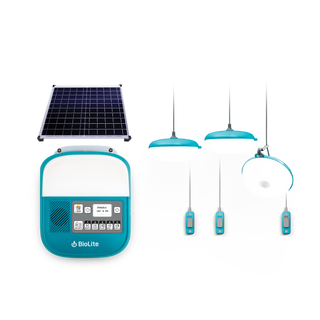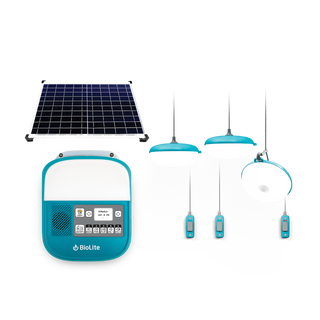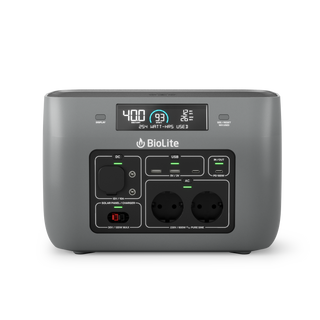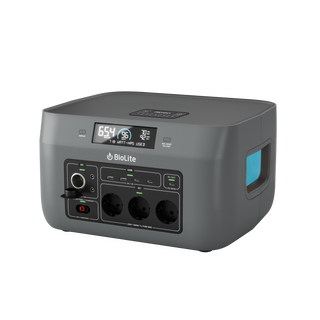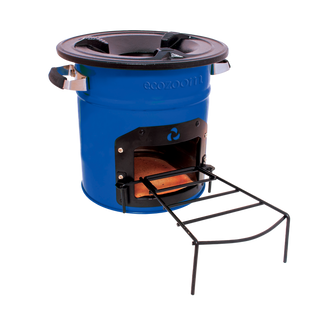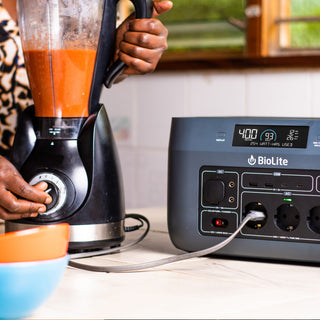Rekha stops and stares for a moment before beginning the 20-minute hike up the hill towards her home. She treads carefully up the steep path that winds through the hillside. Loose rocks cover the dusty ground increasing the risk of her slipping on the way up. A slip is something she doesn’t have time for. She’s carrying a heavy bundle of large branches and sticks that she’s spent the afternoon collecting to use as fuel in her cookfire. She can’t help but think there has to a better way to spend that time each day. She’s responsible for raising four young children and is determined to make a change for them.
Rekha is a hardworking mother of four living in a one-room home in Badgaon, a small village in Rajasthan, India. She’s spent the morning caring for her children, maintaining the house and a large part of the afternoon collecting fuel for her fire.
The homes in her area are so close in proximity that even when she sends the kids outside, the soot from her neighbor’s fires is thick and unavoidable.
When Rekha reaches her home at the top of the hill, she lays the wood down and reserves a small handful to get the fire started. Like many families in rural India, Rekha spends hours cooking on a traditional chulha, an open mud fire pit. It’s a fire that requires her constant attention and rewards her with a constant outpouring of thick black smoke. The smoke gets so bad at times that she has to send her children outside so they won’t be exposed to the toxic air. A temporary solution to what she knows is a much larger problem; the smoke is making them sick.
The homes in her area are so close in proximity that even when she sends the kids outside, the soot from her neighbor’s fires is thick and unavoidable. She is concerned for her children’s health, not taking the time to think of her own because everyone needs to eat after a long day. After a while she gets used to the smoke and stops coughing.
Rekha lives in a village that gas companies have not yet reached because it is too difficult and they know the demographic of the area is unlikely to afford their services. She’s thought of using Liquid Propane Gas (LPG) fuel cylinders but they come at a steep price point, are difficult to find and likely too heavy for her to carry up the steep entrance to her home. Due to her family’s modest income, an alternative cooking option seemed out of her reach.
The Path to Ownership: Accessibility through Affordability
We don’t want upfront costs to get in the way of ownership and have created alternative ways for low-income customers to buy our stoves. We’ve set up key partnerships with microfinance firms in India and sub-Saharan Africa to open HomeStove access to the poorest communities in each region we serve. Microfinance firms help low income families get access to small loans with low interest rates to help them afford the chance of a higher quality life. This can mean small lines of credit to start a business or in our case, a loan to transform their home with a HomeStove.
In Rajasthan we work with Fullerton to offer a range of microcredit loans to individuals and groups who need financial support. By partnering with Fullerton’s Gramshakti program, we open our network up to an entirely new group of rural customers. We host demos at Fullerton’s offices when customers meet for their loan disbursement and also travel with the Fullerton team on morning loan collection meetings held in villages and small towns. By expanding to all of Fullerton's Rajasthan branches, we will have the opportunity to reach at least 30,000 new customers.
Bridging The Gap
Recently, BioLite Sales Promoters accompanied the Fullerton team on a loan collection meeting to Rekha’s village. Rekha attended the BioLite demonstration and as she watched the Sales Promoter light the stove and wave his hand above the smokeless flame she nodded. She knew that the electricity feature on the stove would convince her husband that this was the answer they’d been looking for.
Rekha approached the Fullerton and BioLite team to inquire about getting a HomeStove. With a good history of making loan payments, she was found to be eligible for a top-up loan. A top-up loan works with her existing loan through Fullerton. The HomeStove price is added to it in increments each month until it is paid off. For Rekha, both her Fullerton loan and HomeStove will be paid off over the next 12 months. Once the loan details were in place, she worked with BioLite to schedule a time for home delivery. Upon arrival, Rekha learned to light the stove on her own and was trained through how to maintain the stove over time. At Rekha’s home she is now the proud owner of a HomeStove. Her customized loan paved the way for cleaner air in her home, easier days and a satisfied mother. Rekha lights the HomeStove, waves her hand over the smokeless flame just as she saw during the demo and smiles. It means that she can now cook indoors without worrying about her children’s health. There is no more smoke to fill their lungs and she is happy to have one less thing to worry about.
On top of that, she now has time on her hands. The HomeStove is efficient and doesn’t require as much wood as her chula. She has time on her hands and can pick up an extra job to supplement her family’s income. Rekha also likes that she and her husband are spending more time together. He is so impressed with the stove that he often helps her prepare meals while his cell phone charges.
Changing 50,000 Homes in 2016
Beyond Rekha’s village there are many families who still need access to clean cooking options and electricity but can’t afford it. Rajasthan is a state filled with rural villages that have some of the lowest income households in the country. Microfinance partnerships provide a way for us to reach the poorest households and help them afford safe energy. By supporting Get Soot Done today, you will allow us to fund the expansion of partnerships with microfinance firms like Fullerton, a program which alone is set to serve 30,000 new families next year.

